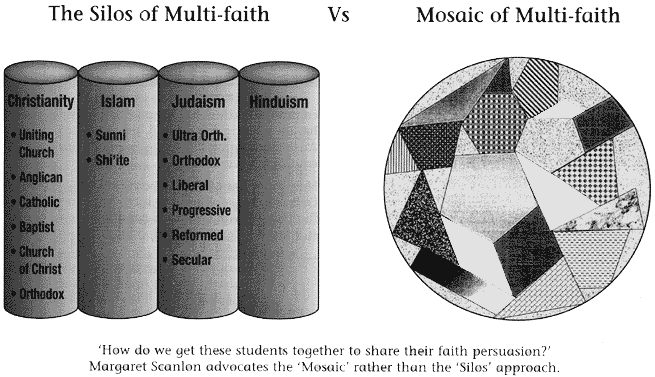Education of young people, particularly in schools, was the theme of two public sessions of the first Council of Christians and Jews National Conference. On Sunday evening speakers from three Melbourne private schools: Catholic, Muslim and Jewish, outlined their approach to promoting interfaith understanding. Three speakers at the Monday morning workshop talked more specifically about religious instruction in schools.
The schools represented at the first session had taken part in the Harmony Program, which brought together students from different backgrounds for activities designed to foster mutual understanding. All participating schools found that students benefited enormously. John Finn (Xavier College), Adulkarim Galea (King Khalid College) and Genia Janover (Bialik College) described how their own school?s commitment to teaching the core values of tolerance and understanding underpins their programs.
A common theme was that ?education of the heart is at the heart of education?, and all schools were committed to teaching students ?to do good as well as to do well?. One presenter said that all recognise ?the school?s rhetoric must match reality?.
The three speakers on Monday morning reflected on the topic of religious education. Margaret Scanlon, Director of Education in Schools for the Uniting Church, proposed a ?mosaic of faith?, rather than a ?silo? approach (see below). She stressed the importance of education about ?living with the neighbour who is different? and suggested that the topic of ?hospitality?, a concept common to all faiths, can be a powerful tool. The starting point for Zvi Civins (Head of Jewish Studies, Bialik College) was that ?religion and values are caught not taught?, and he challenged participants to examine their own assumptions. For example, should we be talking about ?teaching religion? or ?teaching about religion?? If it?s all just about general values, then which values? He also pointed to the difficulty of teaching about other religions without making value judgements ? a fine line that the Harmony Program managed to tread.
For Jill Simmons (Council for Christian Education in Schools), an important issue is ?moving students from knowing the good to be desirable to desiring to do the good?. She emphasised the importance of training teachers ?to help them see the spectacles they are wearing?.
The two sessions demonstrated that promoting religious understanding and respect is a complex task. The clear implication for the CCJ is that learning what schools are already doing will help us identify how to provide support for education in the future.



